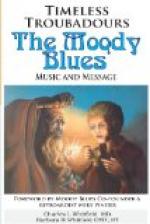“The generous and frank, the worthy and attractive of whom men thought that in him were increased the qualities of the young king, of Richard the high renowned, and of the Count Godfrey, all the three valiant brothers.” Peire Vidal in one of the poems which he addressed to Alfonso VIII., speaks of the attractions of Spain. “Spain is a good country; its kings and lords are kindly and loving, generous and noble, of courteous company; other barons there are, noble and hospitable, men of sense and knowledge, valiant and renowned.” Raimon Vidal of Bezaudun, a Catalonian troubadour has given a description of Alfonso’s court in one of his novelas. “I wish to relate a story which I heard a joglar tell at the court of the wisest king that ever was, King Alfonso of Castile, where were presents and gifts, judgment, worth and courtesy, spirit and chivalry, though he was not anointed or sacred, but crowned with praise, [116] sense, worth and prowess. The king gathered many knights to his court, many joglars and rich barons and when the court was filled Queen Eleanor came in dressed so that no one saw her body. She came wrapped closely in a cloak of silken fabric fine and fair called sisclaton; it was red with a border of silver and had a golden lion broidered on it. She bowed to the king and took her seat on one side at some distance. Then, behold, a joglar come before the king, frank and debonair, who said ’King, noble emperor, I have come to you thus and I pray you of your goodness that my tale may be heard,’” The scene concludes, “Joglar, I hold the story which you have related as good, amusing and fair and you also the teller of it and I will order such reward to be given to you that you shall know that the story has indeed pleased me.”
The crown of Castile was united with that of Leon by Fernando III. (1230-1262) the son of Alfonso IX. of Leon. Lanfranc Cigala, the troubadour of Genoa, excuses the Spaniards at this time for their abstention from the Crusades to Jerusalem on the ground that they were fully occupied in their struggles with the Moors. Fernando is one of the kings to whom Sordello refers in the famous sirventes of the divided heart, as also is Jaime I. of Aragon (1213-1276), the “Conquistador,” of whom much is heard in the poetry of the troubadours. He was born at [117] Montpelier and was fond of revisiting his birthplace; troubadours whom he there met accompanied him to Spain, joined in his expeditions and enjoyed his generosity. His court became a place of refuge for those who had been driven out of Southern France by the Albigeois crusade; Peire Cardenal, Bernard Sicart de Marvejols and N’At de Mons of Toulouse visited him. His popularity with the troubadours was considerably shaken by his policy in 1242, when a final attempt was made to throw off the yoke imposed upon Southern France as the result of the Albigeois crusade. Isabella of Angouleme, the widow of John of England, had married the Count




